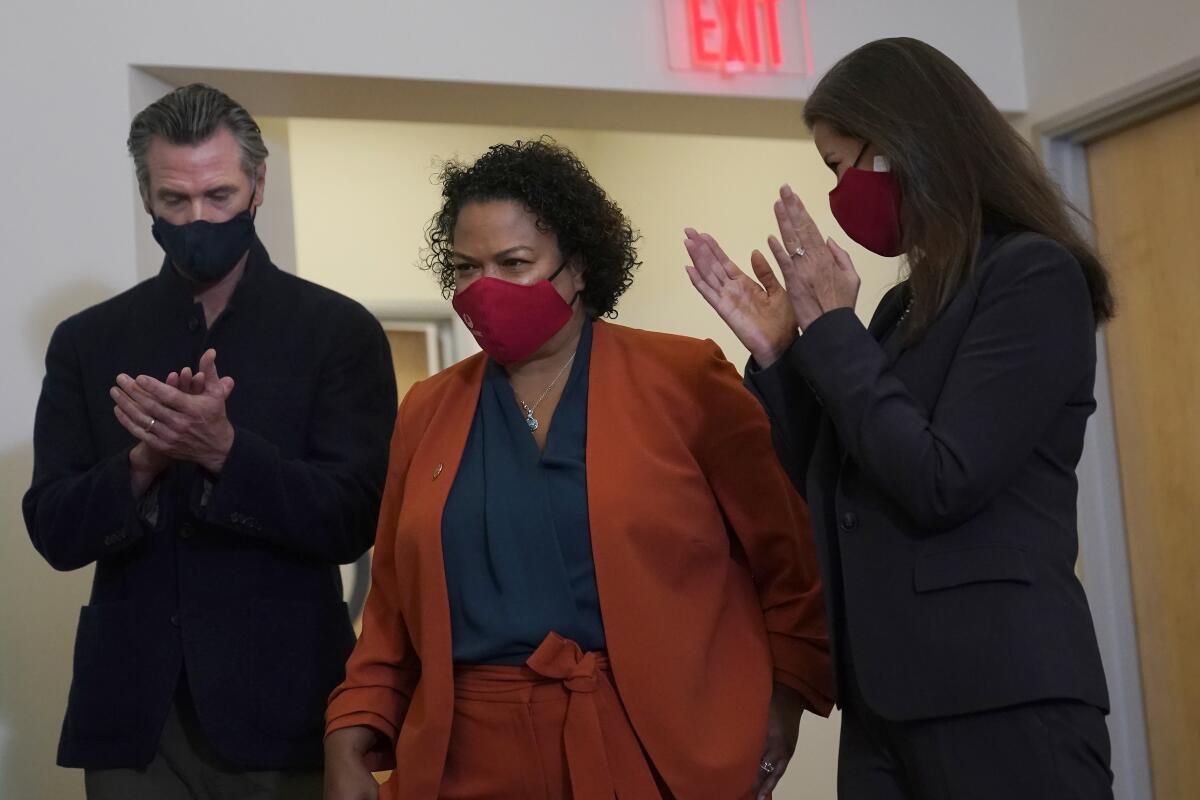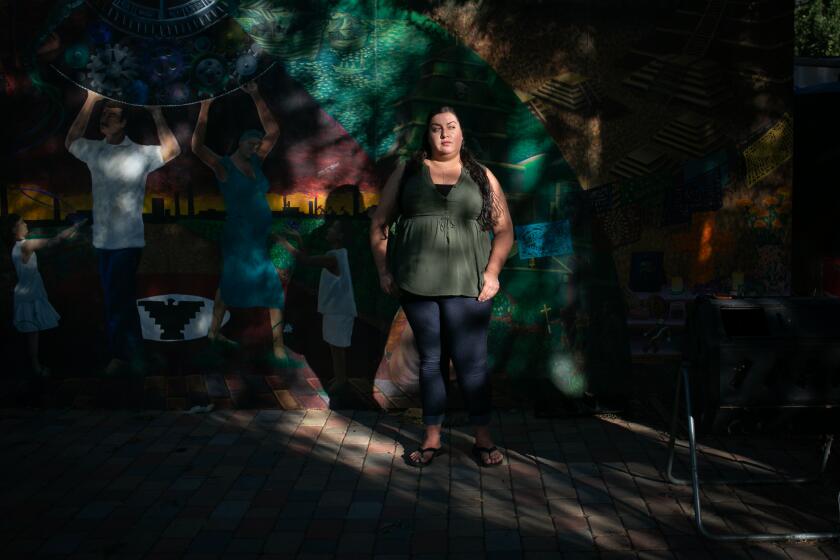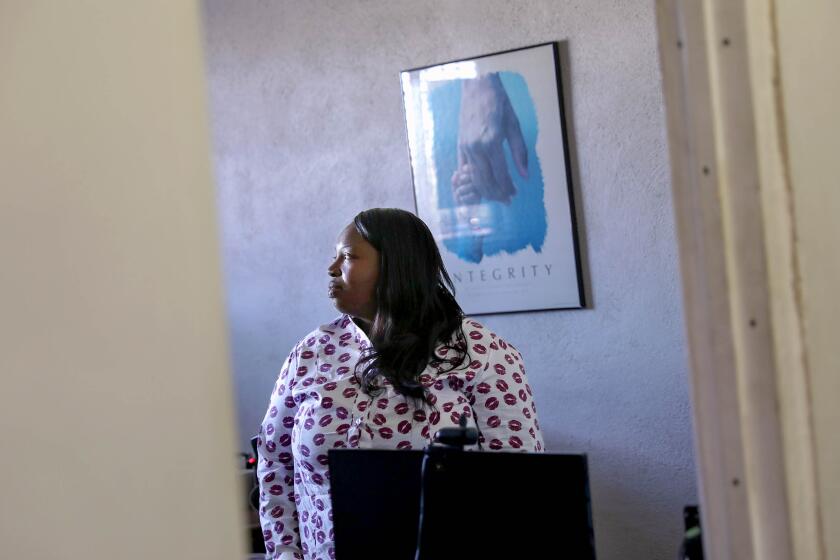New bill takes aim at California’s slow progress clearing pot convictions

- Share via
California would set new deadlines to dismiss and seal many cannabis convictions under a bill introduced Wednesday aimed at redressing anti-drug laws that disproportionately targeted communities of color.
The move comes two weeks after a Times investigation found that tens of thousands of Californians are still stuck with felonies, misdemeanors and other cannabis convictions on their records. Despite a 2018 law that required the state to clear cannabis convictions, many courts have been slow to process cases, The Times found.
“California made a promise. I’m focused on making sure that California keeps its promises,” said the bill’s author, Assemblymember Mia Bonta (D-Alameda). “This bill would allow us to automatically seal qualifying cannabis criminal records.”
More than 30,000 Californians are stuck with felonies, misdemeanors and other convictions on their records that should have been wiped ‘automatically.’
The measure would give the courts until Jan. 1, 2023, to update case records and transmit them to the state Department of Justice, which maintains the statewide criminal history database and responds to background checks. July 1, 2023, would be the deadline for the state DOJ to modify its records accordingly.
The change would “clarify the intent” of the 2018 law, Bonta said. The Times investigation found that at least 34,000 marijuana records still have not been fully processed by the courts. Under the bill, the state DOJ would move forward updating its records if courts or prosecutors failed to make their deadlines.
“By default, the record would be sealed if the case is eligible,” said Bonta. “There are 34,000 people in the state of California ... who are not able to truly and fully live their lives because there has been a failure to fully implement the law.”
The bill’s sponsor is the Last Prisoner Project, which advocates for cannabis criminal justice reform nationwide. In a statement, the group’s state policy director, Gracie Burger, said the bill would “ensure that California delivers on its overdue promise to those harmed by the War on Drugs.”
The promise of ‘social equity’ has been a key narrative tied to California’s legalized pot industry. So far, efforts have been mired by costly delays.
Los Angeles County Deputy Public Defender Nick Stewart-Oaten responded favorably to the proposed legislation.
“For decades, the justice system quickly and enthusiastically destroyed the lives of men, women, and children accused of nonviolent marijuana offenses — this bill simply requires the system to act with similar enthusiasm and speed when giving the formerly convicted back their lives,” Stewart-Oaten, a board member of the California Public Defenders Assn., said in a statement.
Felicia Carbajal, executive director of the Social Impact Center in Los Angeles, said the bill was “a great step in the right direction ... to make sure we’re not leaving behind the most harmed people.”
Court officials blamed a combination of factors for delays, including COVID-19, staffing shortages, outdated case management systems, old records that require manual review and technical issues.
The Times investigation found that some superior courts haven’t fully processed a single case. This includes Riverside, where 21,000 cases are languishing, and San Bernardino with 5,400 cases.
“The court doesn’t really have any comment on the pending legislation but if it is passed, we will of course ensure compliance,” Riverside Superior Court spokesperson Marita Ford wrote in an email.
San Bernardino Superior Court spokesperson Julie Van Hook said: “The court has begun working on these cases, and resources permitting, intends to complete the work by July 1, 2022.”
The delays are not for lack of funding, The Times reported. The courts received $16.83 million in state funds for processing records. The Judicial Council, which oversees the superior courts, distributed the money among the counties but does not track how much progress courts have made. San Bernardino received more than $840,000 and Riverside received $638,000, according to Judicial Council data.
California’s legalization of recreational cannabis in 2016 ushered in a multibillion-dollar industry estimated to be the largest legal weed market in the world. But many of the promises of legalization have proved elusive. In a series of occasional stories, we’ll explore the fallout of legal pot in California.
When California voters legalized cannabis for recreational use in 2016, one promise was the creation of a legal pathway through the courts for clearing many past marijuana-related convictions or reducing them to a lesser charge.
It was a step championed by reform advocates, meant to right many of the injustices inflicted by the nation’s war on drugs that was disproportionately waged on poor people and communities of color.
The 2018 law — AB1793 — was supposed to clear past cannabis convictions en masse, doing away with the need to file individual court petitions — an onerous process that few Californians undertook, whether for lack of resources or awareness it was an option. The burden was placed on the state to automate the process of identifying eligible cases, updating records and dismissing and sealing many of them so they do not appear on background checks.
The law was the first in the nation to offer automatic record clearance for marijuana convictions.
California Atty. Gen. Rob Bonta, who authored the law to clear criminal records while he served in the legislature, acknowledged problems with its implementation.
“It’s not acceptable. It’s taking too long,” Bonta told The Times in an interview in December.
Mia Bonta replaced her husband in a special election in September after he was appointed attorney general.
The delays in clearing drug charges can have dire consequences for those seeking employment, professional licensing, housing, loans and in other instances in which background checks are required.
Under the bill, the Judicial Council would be tasked with collecting data on cannabis record clearance statewide and issuing regular public reports. The agency’s Legislation Committee will review the bill over the next few months, a representative said.
The bill would also expand eligibility for cannabis record clearance to include a conspiracy conviction known as a “wobbler.” In such conspiracy cases, prosecutors have discretion to charge what would otherwise be a misdemeanor as a felony.
Additionally, the measure calls for the state DOJ to lead a public awareness campaign so that people would know their records had been updated and that they no longer have to disclose convictions.
So far, no groups have come out in opposition to the bill. The California Police Chiefs Assn., which opposed the 2018 cannabis record clearance bill, did not respond to a request for comment.
“I hope this will start conversations about some of the other failings of the War on Drugs [beyond cannabis],” said Carbajal, executive director of the Social Impact Center.
Bonta acknowledged that cannabis convictions comprised one front within a larger project of repairing the harm of drug prosecutions.
“Black people, people of color, especially were targeted by the War on Drugs,” said Bonta. “[The bill] is in a sense a form of reparations.”
More to Read
Sign up for Essential California
The most important California stories and recommendations in your inbox every morning.
You may occasionally receive promotional content from the Los Angeles Times.

















